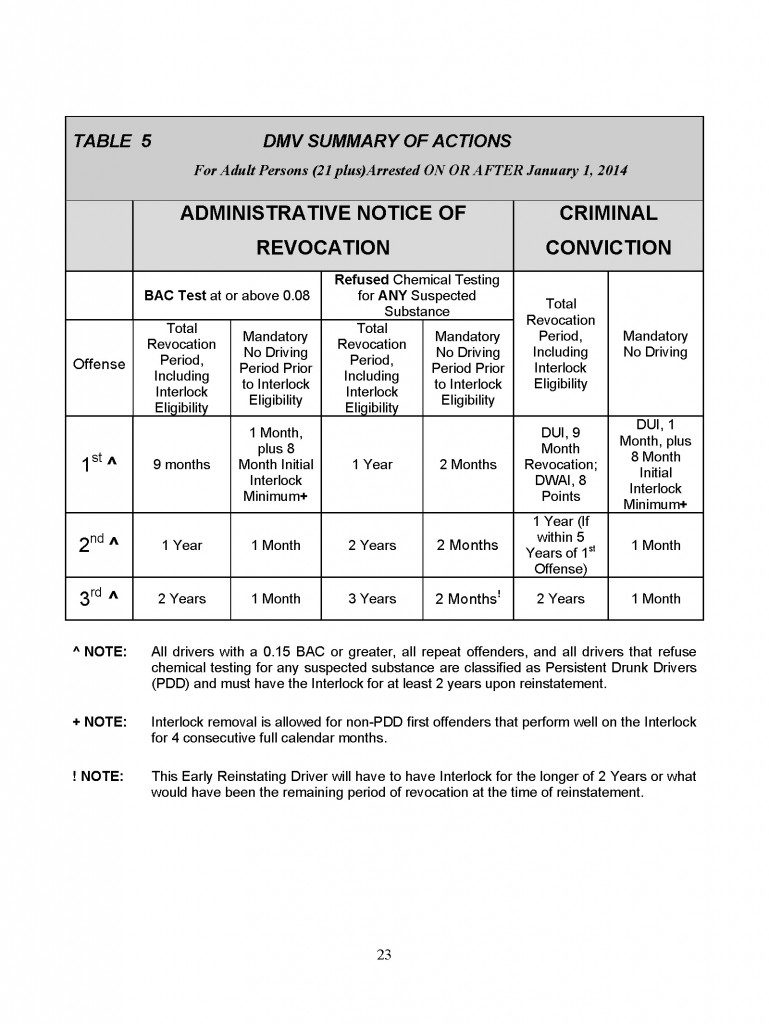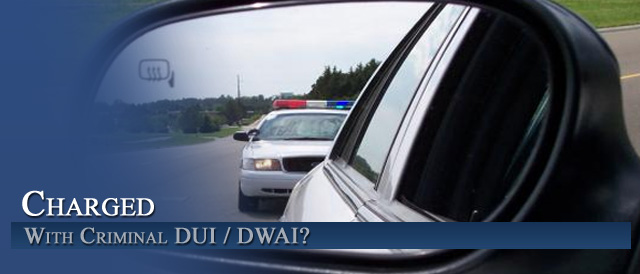
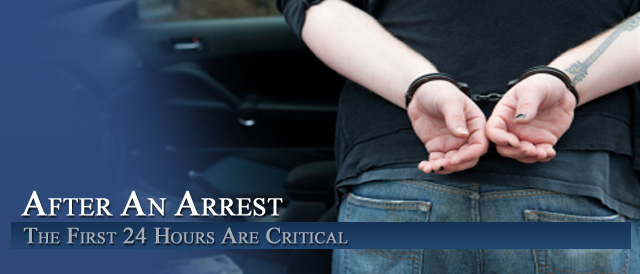

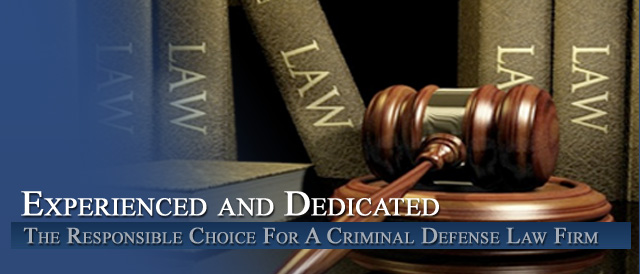
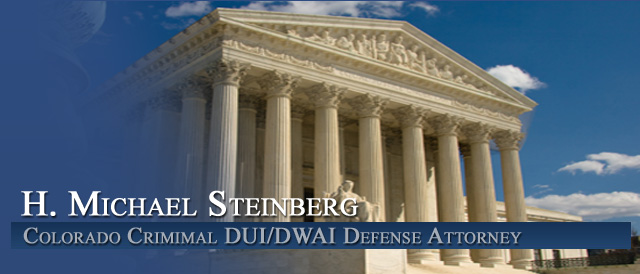
\
A Guide To The DMV Side Of Colorado DUI Cases Part I Of IV
By H. Michael Steinberg Colorado DUI – DWAI – DUID Criminal Defense Lawyer
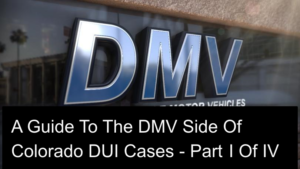 A Guide To The DMV Side Of Colorado DUI Cases Part I Of III – Almost all Colorado DUI prosecutions have a civil or “administrative side” of the case that is the jurisdiction of the Colorado Department of Revenue, Motor Vehicle Division (the DMV). This second “side” of the case can be very confusing to persons charged in Colorado DUI Criminal Cases because the DMV side is completely separate from the criminal case and is not directly related to the criminal case. Both “sides” of the case have to be defended vigorously.
A Guide To The DMV Side Of Colorado DUI Cases Part I Of III – Almost all Colorado DUI prosecutions have a civil or “administrative side” of the case that is the jurisdiction of the Colorado Department of Revenue, Motor Vehicle Division (the DMV). This second “side” of the case can be very confusing to persons charged in Colorado DUI Criminal Cases because the DMV side is completely separate from the criminal case and is not directly related to the criminal case. Both “sides” of the case have to be defended vigorously.
Part I addresses the different kinds of hearings, the rules regarding how you request a hearing and the procedures followed during the hearing.
First – The Confusion
The Colorado DMV imposes driver’s license sanctions that are independent of what occurs in the criminal side of the case. For example, a person can go to trial and receive acquitals on all charges and still lose their driver’s license for refusing to take the blood or breath test under Colorado’s Express Consent Law.
Colorado criminal defense lawyers who defend DUI cases are aware of the critical importance of the DMV side of their client’s case. Where there are DMV collateral “consequences” to a DUI case – there is a right to a hearing that is conducted by a Department of Revenue “hearing officers.”
Hearings officers serve essentially as judges who decide, after applying the law, whether driver’s license revocations are imposed and the length and terms of suspensions, revocations and denials of Colorado driver’s licenses.
Defining the Two Basic Types Of DUI DMV Hearings – The Per Se And The Refusal Hearing
Under certain DUI fact patterns a revocation hearing is required:
1. The Per Se Hearing: The suspected DUI driver takes a blood or breath alcohol test when there is probable cause to believe he or she is under the influence of alcohol, drugs or a combination of both and the result of the test is a score that is equal to or greater than the limit set by the legislature for that class of driver. For adults, that is .08 BAC. (For under age drivers (under 21 or UDD drivers) that limit is .02 and for commercial drivers it is .04.)
There is no Per Se revocation in drug related DUID (Driving Under The Influence Of Drugs).
2. The Refusal Hearing: Here, the suspected DUI driver refuses to take a blood or breath test when there is probable cause to believe he or she is under the influence of alcohol, drugs or a combination of both.
The two types of hearings are call “Express Consent” hearings and usually take place before the criminal case is resolved. The sanction for losing the hearing is an administrative driver’s license punishment.
For example, a suspected DUI driver can lose his or her license because they refused the “test” and then receive a driver’s license suspension a conviction for DUI. While these are separate outcomes and the resulting suspension will usually run together (concurrently, the result can also be cumulative, with driver’s license revocation running consecutive to one another.)
Whil it may feel as if you are being punished twice for the same act, this is NOT a violation of your constitutional right against double punishment or double jeopardy.
What Happens When Your BAC IS Over .08 – The Breath Test Per Se Revocation Process
When you choose the breath test after you have been advised of Colorado’s Express Consent Law and that test result exceeds .08 for adult non-commercial drivers, the police officer will take your driver’s license from you immediately. It does not matter whether that license is a Colorado or an out of state license, after seizing the license the officer will fill out and serve you with a form called the Affidavit and Notice of Revocation.
That Affidavit and Notice of Revocation designates that the officer has probable cause to believe that the license should be revoked. If your driver’s license is valid (not under some sort of revocation), the Affidavit and Notice of Revocation acts as a temporary permit and allows you to drive for SEVEN 7 Days. Keep it on your person or in your vehicle at all times.
If a hearing is not requested, the revocation automatically takes effect on the eighth CALENDAR day (unless that day falls on a holiday or a weekend.)
What Happens When Your BAC IS Over .08 – The Blood Test Per Se Revocation Process
If you choose the blood test, the police officer cannot seize your driver’s license because the result will not be known for some time (usually several weeks if not months). The officer must wait for the laboratory test results before initiating the license revocation procedure.
If the blood test result (which is mailed to the officer from the testing lab) is equal to or greater than the per se limit, the officer will then fill out the Affidavit and Notice of Revocation and send it and the test result to the DMV.
The Order Of Revocation Is Mailed To Your Last Known Or Provided Address – Be Careful
This is important – the DMV then mails you an Order of Revocation and it is mailed to the last known address that the DMV has in it’s records. If there is a different address on the Affidavit, the DMV must send the Affidavit to that address as well. The order establishing the right to request a hearing is deemed received three days after it is mailed – so KEEP the letter and the envelope it came in case there is an issue with the sever day deadline.
The Order of Revocation is self explanatory… if you don’t request the hearing within the deadline outlined in the letter you will lose your right to drive without an opportunity to contest the DMV’s Order of Revocation.
Your right to a hearing will be granted only if a written request is received by the DMV prior to that date. ( See Section On How To Request The Hearing – Below).
How Long Will My Colorado Driver’s License Be Revoked For A Per Se Revocations: BAC .08 Or More?
Length Of Revocation First Per Se (BAC .08 or Greater)
First Per Se Revocation: When a driver’s license is revoked for the first time for having a blood or breath alcohol content of .08 or more, the revocation is for nine months.
Second Per Se Revocation: If your driver’s license previously been revoked for a per se violation, the revocation is for one year.
Third Or Subsequent Per Se Revocation:… two years.
No Discretion Or Authority To Change The Length Of The Revocation
Unlike other forms of revocation – such as the famous “red license”or probationary license – the Colorado DMV cannot change the length or the terms of the revocation. There is no discretion to weigh the impact of mitigating or hardship issues – the revocation is imposed uniformly.
Early Reinstatement Under The Ignition Interlock Program
The good news is Colorado’s Ignition Interlock Program which does NOT require a separate hearing
First Time Per Se Revocation: A Colorado driver who is more than 21 years old can reinstate their right to drive under a “restricted license” after one month of the revocation period has run (absolutely no driving for 30 days) and serve the remaining eight-month revocation period using an ignition interlock device installed on their car.
If, after FOUR CONSECUTIVE MONTHS have run on the revocation period and there have been no “hots” (no high BAC’s or incidents of tampering with the device), the eight month revocation period can be cut short and full reinstatement will be available to the driver.
The Colorado Ignition Interlock program does not require persuading a hearing officer to permit the restricted license. You need only apply and, if accepted, there are no restrictions on the times or purposes for which you can drive.
You can drive after serving the first 30 days of their nine-month revocation but only in a vehicle equipped with the ignition interlock device.
How Long Will My Colorado Driver’s License Be Revoked For A Per Se Revocations: BAC .17 Or More?
If your test result was .17 BAC or higher the ignition interlock restricted license increases to two years and notwithstanding the level of alcohol education ordered by the court, you must complete a minimum of 66 hours of alcohol education and therapy.
To reinstate – the DMV requires completion and proof of enrollment (not completion) of a level II alcohol education and therapy in order to have their drivers license reinstated.
Dual Or Multiple Driver’s License Restraints And DUI Revocations – Concurrent Revocation Periods
It is uncommon for Colorado drivers who are under per se revocations also to be subject to other actions against their licenses. What is important here is that in almost all of those situations, the total period of the actions cannot exceed the longer of the two revocation periods.
The most common example of a “concurrent revocation” is a per se revocation for a test result over a .08 BAC followed by a suspension based on a conviction in the DUI criminal case that results in a 12 point suspension after the conviction reaches the DMV.
How Long Will My Colorado Driver’s License Be Revoked If I Have A Per Se Revocation As A Minor Driver?
Minor drivers are treated differently than their adult counterparts. If you are under the age of 21 with a per se revocation for minor drivers (BAC greater than .02 but less than .08). There will be a one month revocation period followed by two months of probationary license for the first such revocation.
If your first revocation is for a BAC of between .05 and .08 – the revocation period is three months, with no driving for the first 30 days.
The second per se revocation is a six month revocation period, and a third or subsequent revocation is an entire year.
Criminal Court Anomaly For DUI – DWAI Conviction.
If you are under 21 and are convicted for either DUI or DWAI, there is a one-year revocation but if you have already started the DMV side revocation – you will receive credit for that time against the one year
How Long Will My Colorado Driver’s License Be Revoked For A Per Se Revocation For A Commercial Driver: BAC 04 Or More
Because of the dangers posed by commercial drivers on the highways, a commercial driver with a BAC .of 04 or more is revoked for one year for a first offense. For a second or subsequent revocation,
the penalty is the lifetime denial of the privilege to have a commercial driver’s license!
What IS A “Refusal” DUI DMV Revocation Matter?
A Colorado DUI investigation can be broken in stages.
Stage 1, not the subject of this article, requires reasonable suspicion to stop a vehicle.
Stage 2 requires the police officer to have a quantum of proof called probable cause that the driver is at least impaired by alcohol, drugs, or a combination of both.
Stage 3 could be called the “Express Consent” stage where the driver must submit to a blood or a breath test. If the driver refuses to take such tests or fails to cooperate with the taking of such tests (such as refusing to sign release forms, not blowing hard enough into the Intoxilizer or unreasonably changing one’s mind between blood and breath tests) the police officer will then initiate a driver’s license revocation proceeding.
In the case of “a refusal,” the police officer will take Just as in per se breath test cases, the police officer takes immediate possession of the arrested person’s driver’s license. The police officer then fills out, signs and serves an Affidavit and Notice of Revocation which contains a seven-day temporary permit.
The above description is followed by the same factors that apply revocation action to those prescribed for per se revocations (above).
How Long Will My Colorado Driver’s License Be Revoked For Refusal Revocations: Ordinary Drivers
If you refuse the “test” under Colorado’s Express Consent law your driver’s license is revoked:
First time refusal: Driver’s license is revoked for the revocation is for one year.
Second time refusal: Driver’s license is revoked for two years.
Third and Subsequent refusals: three years.
Refusal Revocations Harsher – They Run Consecutively To Other DMV Driver’s License Actions
Unlike “per se” revocations (see above) “refusal” revocations run consecutively to any other action against the person’s license and there is no authority given to the Hearing Officers to change the length or terms of the revocations.
BUT – what brings many out of state drivers to Colorado, even drivers with one or more refusal revocations are eligible for driving privileges under Colorado’s Ignition Interlock Program after one year of the revocation is served.
How Do I Reinstate My Colorado Driver’s License Following Per Se And Refusal Revocations?
To reinstate your Colorado driver’s license after a per se or refusal revocation, a Colorado driver must present and SR-22 form (proof of insurance for the future) and pay a $95 fee.
Minor drivers have the added requirement of completing a Level I alcohol education course as a further condition of reinstatement.
If your BAC was .17 or greater you are also required to complete a Level II alcohol and drug education and treatment program to reinstate your Colorado driver’s license but while you are taking the course – with proof you are currently enrolled in a Level II program – you can reinstate.
The Interlock Requirement for a BAC of .17 or greater blood alcohol level is two years and both a written and driving test are also required to obtain a new license.
The DMV – DUI Revocation Hearing – The Mechanics Of Initiating The Hearing
First – Never Forget The 7 Day Deadline
Above all else, even if you later decide not to proceed with defending the Colorado DMV Hearing, do not fail to request a hearing within seven days of receiving the notice of revocation, or your right to a hearing is waived
Second, remember that the seven days begin running the day after you were arrested. Study the date on the Notice of Revocation. If it not uncommon for a Colorado DUI arrest to occur shortly before or after midnight. The date on the Notice of Revocation may have been filled out on either day.
How Is The 7 Day Deadline Calculated?
The law here outlines how the 7 day period is calculated. The 7 day period is calculated by excluding the first day and including the last, and by counting all calendar days NOT JUST BUSINESS days. if the seventh day falls on a weekend or holiday, the period is automatically extended to include the next business day.
Blood Tests And The 7 Day Deadline
Blood test results delay the running of he 7 day deadline because the Notice of Revocation is mailed. The 7 day deadline may be impacted by the delivery of the mail and therefore, the DMV may extend the deadline if there was an issue with the slow delivery of the DMV Notice of Revocation letter. .
What If No Actual Notice Was Ever Mailed To Me?
If the DMV never provided actual notice or you were was physically incapable of making a timely request, you can ask that the 7 day deadline be waived. The DMV may grant you the hearing, but the revocation period will still run – meaning that a ‘stay” of the revocation will not occur pending the hearing. If the reason you did not receive notice is the DMV did not have your updated address, that is not an excuse they will accept for not requesting a timely hearing.
How To Request The Hearing
In this writer’s opinion, the best way to request the hearing is to appear in person at the DMV to request the hearing. The reason for this will become clear below.
The law provides for mailing or faxing a written request to the DMV, or for your lawyer to file the request. Because hearing requests made by your lawyer must be accompanied by a letter signed by the client requesting the hearing and authorizing the lawyer to execute any paperwork at the DMV necessary for the request, it is usually easier to just do it yourself.
These requests may be made at any Colorado driver’s licensing office.
If the police officer did not seize your driver’s license (as in blood test cases) – for the hearing request to be a valid and a timely request made, you must surrender your valid driver’s license at the time of the request for the hearing.
Only if you surrender your license (or the police officer already seized it – it is sent to the DMV by the police officer if it was seized at the time of the original investigation) will there be an automatic “stay” of the revocation of your driver’s license until the final order is issued following the hear
Thus, if you “valid” Colorado driver’s license has been surrendered, the DMV must, by law, issue you a temporary driver’s permit which is valid until the date of the hearing. As noted, since in breath test and in refusal cases, the driver’s license is surrendered to the arresting officer at the time of the investigation, this is not an issue.
But, if you selected a blood test to determine your BAC, since your license is not confiscated by the arresting officer, you must surrender your valid driver’s license to the DMV at the time the hearing is requested. THAT IS WHY it makes sense to do so in person, so there are no mistakes.
Even if you make a timely request for a hearing – if that request is not accompanied by the surrender of a valid license, you have the right to a hearing, but the revocation of your license begins running while the driver awaits the hearing.
Finally, you cannot BOTH request your hearing and start the time frame for the Ignition Interlock Program. If you exercise your option to request the DMV hearing, the issuance of the temporary driver permit means you delay the start of the revocation period.
Requesting The Police Officer’s Presence At The DMV Hearing
There is another option, on the form that you will fill out requesting the hearing, for the police officer who signed the Notice of Revocation (usually the primary investigative officer in the case) to be present to give live testimony at that hearing. While there are different viewpoints on whether he or she should be “subpoened” to the hearing, I encourage my clients to check that box and request the officer’s presence.
The reason for the presence of the officer is to give your lawyer an opportunity to cross examine that officer without another lawyer present. This “shot” at the officer (who is under oath) and “on the record” is extremely valuable. For example, a transcript of the entire hearing is available for use in negotiations with the DA or use at trial to impeach that officer. It is essentially one of the most powerful weapons in the Colorado DUI criminal defense lawyer’s arsenal and should not be wasted.
If you wish the police officer that initiated the revocation procedure to be present at the revocation hearing, that demand is made at the time the hearing is requested in writing. It is an option on the form and requires only a check mark.
The Peculiar DMV Rules For Scheduling The DUI Revocation Hearing
A per se or refusal hearing must be held within 60 days of the day it is requested.
The law permits the police officer to extend that 60 day period for their convenience and to reset the hearing date for a variety of reasons. That request can occur at any time prior to the dismissal of the case. There is no requirement to provide notice to the driver or the driver’s lawyer, unless the conflict is due to vacation, training, or personal leave, – if that is the reason for the rescheduling, it requires 48 hours’ notice.
Here is the good news, if the hearing is delayed at the officer’s request, the DMV must continue your temporary permit until the date of the new hearing.
Compare, A Colorado Driver’s Request For A Continuance Of The DMV Hearing
As noted above, Colorado DMV DUI revocation hearing hearings can be re-scheduled without any consultation with you or your lawyer. Where you or your lawyer cannot appear on the scheduled date you can initiate a request that the hearing be rescheduled.
Here is the rub. While it is true that the DMV is required to consider and attempt to accommodate a timely and legitimate request to reschedule by the driver or his or her lawyer, if the hearing cannot be cannot reset the hearing within the original 60 – day deadline, the hearing WILL TAKE PLACE on the original date, regardless of the hardship to you or your lawyer.
A Guide To The DMV Side Of Colorado DUI Cases Part I Of IV
If you found any of the information I have provided on this web page article helpful please click my Plus+1 or the Share buttons for Twitter and Facebook below so that others may also find it.
The contents of this article are based upon my research, my personal experience and my personal analysis and opinions developed from my thirty six years (as of 2018) of criminal trial experience from both sides of the courtroom – as a former career prosecutor for Arapahoe and Douglas Counties (13 years) and as the owner of my own Criminal Defense Law Firm since 1999 (18 years).
The reader is also admonished that Colorado criminal law, like criminal law in every state and at the Federal level, changes constantly. The article appearing above was accurate at the time it was drafted but it cannot account for changes occurring after it was uploaded.
If, after reading this article, you have questions about your case and would like to consider retaining our law firm, we invite you to contact us at the Steinberg Colorado Criminal Defense Law Firm – 303-627-7777.
Never stop fighting – never stop believing in yourself and your right to due process of law. You will not be alone in court, H. Michael will be at your side every step of the way – advocating for justice and the best possible result in your case. H. Michael Steinberg is passionate about criminal defense. His extensive knowledge and experience of Colorado Criminal Law gives him the edge you need to properly handle your case
 ABOUT THE AUTHOR: H. Michael Steinberg – Email The Author at:
ABOUT THE AUTHOR: H. Michael Steinberg – Email The Author at:
A Denver Colorado Criminal Defense Lawyer – or call his office at 303-627-7777 during business hours – or call his cell if you cannot wait and need his immediate assistance – please call 720-220-2277.
“A good criminal defense lawyer is someone who devotes themselves to their client’s case from beginning to end, always realizing that this case is the most important thing in that client’s life.”
You should be careful to make a responsible choice in selecting a Colorado Criminal Defense Lawyer. We encourage you to “vet” our firm. Over the last 36 plus years – by focusing ONLY on Colorado criminal law – H. Michael has had the necessary time to commit to the task of constantly updating himself on nearly every area of criminal law, to include Colorado criminal law and procedure and trial and courtroom practice.
Putting more than 36 years of Colorado criminal defense experience to work for you.
H. Michael works hard to get his clients the best possible results in and out of the courtroom. He has written, and continues to write, extensively on Colorado criminal law and he hopes this article helps you in some small way – A Guide To The DMV Side Of Colorado DUI Cases Part I Of IV.
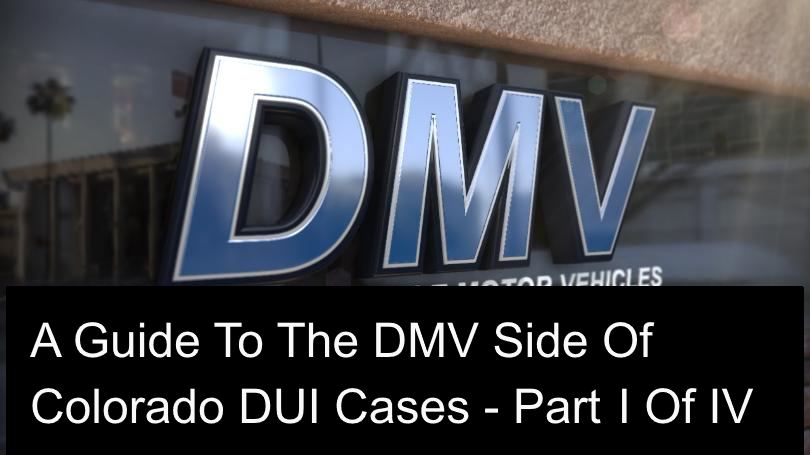
Other Articles of Interest:
- Colorado Criminal Law Guide – Searches Of Your Car – Your Right To Refuse
- Is Taking Ambien A Defense To A Charge Of DUI – DUID In Colorado?
- Sentencing In A Colorado DUI – DWAI – DUID Case – “Re-packaging” The Client Ideas and Arguments
- Colorado Criminal Law – Know Your Rights – Remain Silent – Remain Silent – Remain Silent
- Understanding The Colorado Law Of Careless Driving 42-4-1402 – Bodily Injury Or Death




